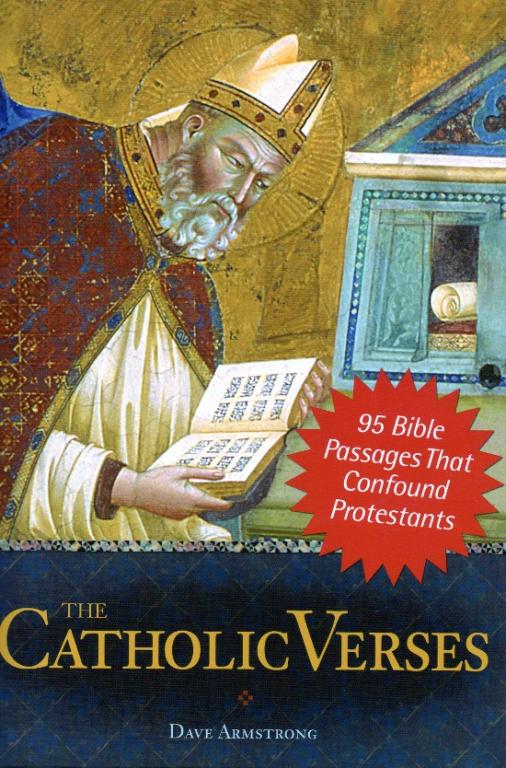
[from my 2004 book, pictured above (see purchase and other information), pp. 97-102]
*****
Acts 16:15 (RSV) “And when she was baptized, with her household, she besought us, saying, ‘If you have judged me to be faithful to the Lord, come to my house and stay.’ And she prevailed upon us” [cf. 18:18].
Acts 16:33 “And he took them the same hour of the night, and washed their wounds, and he was baptized at once, with all his family.”
1 Corinthians 1:16 “I did baptize also the household of Stephanas.”
Catholics (and other advocates of infant baptism) do not claim that these verses prove that the Bible teaches infant baptism. However, a straightforward reading of them suggests that children were likely baptized along with the household or family of which they were a part. Thus, these verses pose a difficulty for Protestants who oppose infant baptism and must be explained differently.
In Acts 16:15, we read, “She was baptized, with her household.” The fact that the verse says household rather than simply husband is a clear indication of others being involved. Now, who are the members of a household? In that time and culture, it probably would have included parents and maybe grandparents, as well as siblings or cousins. And almost always it would also include children.
Extended families are not so common in our culture, but they usually still do (even in our somewhat antilife culture) include children. What’s more, many biblical passages connect household and children (Gen. 18:19, 31:41, 36:6, 47:12; Num. 18:11; 1 Chron. 10:6; Matt. 19:29; 1 Tim. 3:12).
Elsewhere in the Bible, entire households are referred to as being saved (Luke 19:9; Acts 11:14, 16:31). To be saved, one does not necessarily have to be aware of what is happening. For example, say a person was born with a severe brain defect and eventually died without ever having been capable of rational thought or communication. Is that person damned simply because of being unable to believe? I think not.
Most Protestants agree with Catholics that God’s mercy must extend to those who do not yet know or understand the gospel, or else all aborted babies, children who die at a young age, or before the age of reason, and so forth would go to hell (since they either cannot know or not properly understand the gospel). Therefore, to be saved is not necessarily to understand fully either the gospel or the means of grace by which one is saved (and Catholics, Orthodox, and most Protestants include baptism as a crucial factor in this salvation).
Furthermore, St. Paul in Colossians 2:11-13 makes a connection between baptism and circumcision. Israel was the church before Christ (Acts 7:38; Rom. 9:4). Circumcision, given to boys eight days old, was the seal of the covenant God made with Abraham, which applies to us also (Gal. 3:14, 29). It was a sign of repentance and future faith (Rom. 4:11).
Infants were just as much a part of the covenant as adults (Gen. 17:7; Deut. 29:10-12; cf. Matt. 19:14). Likewise, baptism is the seal of the New Covenant in Christ. It signifies cleansing from sin, just as circumcision did (Deut. 10:16, 30:6; Jer. 4:4, 9:25; Rom. 2:28-9; Phil. 3:3).
John Calvin made these arguments, as did Presbyterian theologian Charles Hodge (1797-1878), and these are some of the reasons Presbyterians and the majority of Protestants throughout history have accepted infant baptism (although they differ on whether it regenerates). But Baptists and others today who believe in adult baptism think that baptism has to be performed after a person has made an informed, educated decision to embrace the gospel of Jesus Christ and be born again.
Baptism then serves as a symbol of the faith and regeneration, rather than as a cause of it. With those presuppositions, infant baptism makes no sense whatsoever, because the infant does not know what is going on, and the knowing is crucial to baptism’s purpose, in this conception.
Advocates of this view, then, must explain how these verses pertain to adults but not children. Thus, Augustus Strong (1836-1921), a prominent Baptist theologian, writes about the general issue:
[T]he passages held to imply infant baptism contain, when fairly interpreted, no reference to such a practice. . . . From Acts 16:15, cf. 40, and Acts 16:33, cf. 34, Neander says that we cannot infer infant baptism. For 1 Cor. 16:15 shows that the whole family of Stephanus, baptized by Paul, were adults (1 Cor. 1:16). It is impossible to suppose a whole heathen household baptized upon the faith of its head (Systematic Theology, Westwood, New Jersey: Fleming H. Revell Co., 1907, 951).
But the impossibility resides only in the heads of those who have decided beforehand that the practice is somehow impossible because of prior dogma that does not permit it.
Strong argues that the household of Stephanus consisted only of adults, based on 1 Corinthians 16:15, which calls them converts. But the next verse, by very strong implication, refers to them also as men. Does this mean that Stephanus had no wife, or was a widower with children all past the “age of reason” — able to become disciples and to be baptized on their own? Not necessarily, for it assumes that the language is all-inclusive when it may not be.
Biblical language is often not as precise and “scientific” as modern language. We know that households could certainly include children. And even if we were to grant Strong’s contention about this one family, it would not prove at all that every such family referred to as being baptized did not have children, or that the children were not also baptized. Nor does even the word convert necessarily imply an adult, any more than a “saved” person does (Luke 19:9; Acts 11:14, 16:31).
The biblical case for infant baptism is an argument from plausibility or antecedent probability. The deductions made lead one to conclude that a certain state of affairs is probable, more or less, but not absolutely proven. These deductive steps with regard to infant baptism are as follows:
- All agree that the Bible refers to entire households being baptized.
- It is reasonable to assume that most households (especially in the ancient world) would include children.
- The Bible specifically places children within the parameters of those persons included in a household (if this commonsense assumption even needs to be asserted), at least eight times (see earlier).
- Therefore, it is quite likely that baptisms of entire households would include baptisms of children, at least in some cases, if not in all.
- It is quite unlikely that baptisms of entire households (granting the premise that the households can and usually do include children) would never include children.
- Therefore, infants (in the greatest likelihood) were baptized.
- In which case, infant baptism is sanctioned in Scripture, by apostolic example.
A. T. Robertson, a Baptist whom many consider the greatest New Testament Greek scholar of his time, commented on Acts 16:15:
Who constituted her “household”? The term oikos, originally means the building as below, “into my house” and then it includes the inmates of a house. There is nothing here to show whether Lydia’s “household” went beyond “the women” employed by her who, like her, had heard the preaching of Paul and had believed. . . . In the household baptisms (Cornelius, Lydia, the jailor, Crispus) one sees “infants” or not according to his predilections or preferences (Word Pictures in the New Testament. 6 volumes, Nashville: Broadman Press, 1930, vol. 3, 253).
Robertson’s last statement is undeniably true, and it harmonizes with what I have always believed about the systematic theological assumptions that we all (legitimately, properly) bring to the text, no matter what brand of Christian we are. Thinking itself requires premises and foundational assumptions, and so does biblical exegesis and hermeneutics (interpretation of biblical passages).
Nevertheless, there are stronger probabilities and weaker probabilities. It is a sliding scale. I firmly believe that it is very probable that in this instance, infant baptisms occurred.
Yet I continue to think that if we could make ourselves as “untheological” as humanly possible for a moment, if we could pretend we were from another planet or had never seen a Bible, and look at the two competing cases, we would conclude that the infant-baptism argument is far more plausible. I and those in my camp are certainly not without bias, just as Robertson honestly notes, but in my opinion the logic can hold up on its own.
As for Robertson’s argument concerning the makeup of Lydia’s household, it may or may not be successful. Reasonable men can certainly differ. I do not find it very persuasive, although it is interesting and has some worth. In any event, it is also based on probability, just as Strong’s argument was, and does not rule out other households that were different.
In no way, then, is it decisive for the adult-baptism position. Critics of infant baptism like to point out that the Bible never specifically commands us to baptize infants. But neither does it tell us that we should baptize only adults, or those past the age of reason who can make their own “personal commitment” to Christ.
These kinds of discussions in theology and apologetics are fun and enjoyable (while at the same time serious) precisely because in some areas the biblical evidence is not airtight and involves speculation. As the Christian Church reflected through the centuries, the overwhelming consensus, even among the great majority of Protestants, came to be that infant baptism was God’s will, and strongly implied in Holy Scripture.
It means something when such consensus has been reached, and we cannot so easily dismiss it. God may communicate his truth to me personally, but he has also done so to millions of other Christians throughout nearly two thousand years. That being the case, views that have garnered “majority support” need at least to be considered respectfully and carefully.
This is not to imply that the majority is always right, but rather, simply to note that Christian tradition is important, allowing for what G. K. Chesterton called “the democracy of the dead.”
***
(originally from 2004)
***













